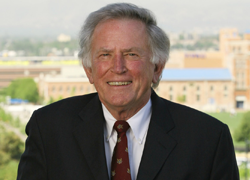
On Saturday, November 5th former United States Senator Gary Hart spoke at the 44th Annual Sutton Colloquium in International Law. Hart’s talk, entitled “Strategy, Collective Security, and the Global Commons” focused on the need for a new “grand strategy” in tackling U.S. foreign security threats and global economic concerns.
Hart began by painting the scene in history: the Cold War ended over 20 years ago, yet NATO has yet to define a twenty-first century mission. Hart said that during the Cold War, it was sufficient for the U.S. policy maker to “merely react” to foreign events as they arose, taking protectionist measures such as tightening borders. But in the last decade, the United States has been met with a wave of new realities that call for a major reformation of national security policy.
These “new realities” are both military an economic. First, nation-state wars are in decline. The events of September 11, 2001 forced the U.S. military to recognize non-state actors and engage in irregular, unconventional warfare. Second, the economy of the United States has fundamentally changed over the past decade. Hart pointed out that information has replaced manufacturing as the economic base of the nation. “Globalization and information are eroding the sovereignty of nation states,“ he said.
In light of these new economic and military realities, Hart said that a unilateral approach to foreign security and international economic interests is “no longer possible.” He emphasized that new global threats cannot be adequately addressed by one military or one nation alone. In crafting a new grand strategy on national security and foreign relations, Hart provided three guiding principles: (1) economic innovation, (2) networked sovereignty, and (3) integrated security.
First, Hart discussed a need for investing public funds and private capital in science, research, and education. He said that the U.S. will only be able maintain its global position over time through creativity and economic innovation, and that such measures cannot be financed with borrowed money.
Second, Hart discussed the idea of networked sovereignty, emphasizing the need to work with other nations to identify and fight common threats before those threats become toxic. He suggested networking public health services through common databases to quarantine viral pandemics, and working with other countries to create an enforcement mechanism for an international treaty on green house gas reduction.
Finally, Hart discussed the creation of an integrated security network through which member states could work together to confine local conflicts. To exemplify how an integrated security network could operate, Hart discussed the creation of a zone of international interest in the Persian Gulf, where importing nations could work together to suppress conflict in the region and ensure a continuous supply of oil.
Despite the optimistic message of the talk, audience members expressed concern at Hart’s lack of specifics. Amid the recession and national debt crisis, investment in research and education seems unlikely and impractical. It also seems unlikely that Department of Defense, faced with massive budget cuts, is capable of spearheading the development of the globally networked security programs Hart so adamantly discussed. Hart admitted that he didn’t have all the answers but said that the U.S. needs to keep “trying new things” until it makes affirmative progress on these issues.


